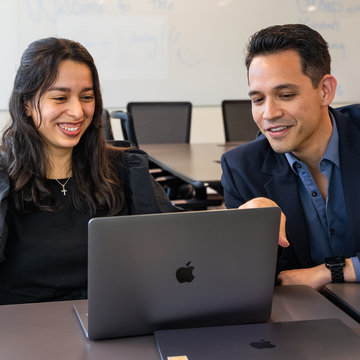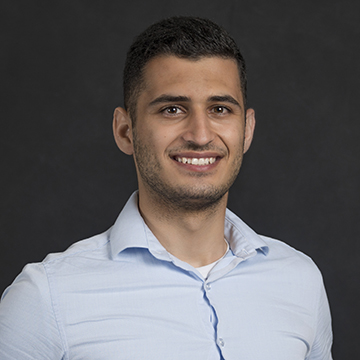Online Master of Science in Education
Master Leadership in Education with the Online MS in Education Program
Advance your career with Pepperdine's 15-month, online Master of Science in Education designed to prepare leaders across four in-demand fields through concentrations in:
- Organizational Leadership and Learning
- Leadership in Higher Education
- Leadership in Pre-K to 12 Education
- Leadership in Learning Design and Technology
While the program's core curriculum builds critical foundational knowledge, each concentration equips students with the targeted skills needed to drive change and lead effectively in their chosen area. Whether you aim to excel in your current role or advance to the next level, this degree provides the skills and strategies to lead confidently, influence positive change, and make a meaningful impact—all in a flexible online format.
You'll master instructional and leadership theories, apply them to real-world scenarios, and develop competencies in designing and implementing effective learning processes. By the end of the program, you'll be equipped to enhance learning outcomes for diverse audiences in any setting. Become the transformational leader your industry needs—whether in education, business, healthcare, technology, or any other field. This degree will empower you to drive organizational success and stay ahead in today's evolving landscape.
Note: This degree does not lead to licensure for teaching.
Online Program Highlights
In our online MS in education degree, you’ll learn to lead effectively through advanced learning theory — and to foster inclusive learning environments in organizations and academic environments.
Online Format
Coursework is completed online so you can continue your personal and professional responsibilities while earning your degree.
In-Person Malibu Immersion
The Malibu immersion is an optional course that happens annually during the Fall term. The immersion lasts one weekend and takes place on Pepperdine University’s campus.
Quick Facts
| Format: | Online |
| Term: | Fall, Winter, Spring |
| Length: | 15 months |
| Tuition: | $1,605 per unit |
Four concentrations available
Specialize your leadership skills to cater to the needs of your industry.
No GRE or standardized tests required
We focus on your commitment to success in our admissions process, not your test scores.
Pathway toward doctorate
Some units, upon acceptance, will apply to your choice of GSEP’s four doctoral programs.
Complete in 15 months
Learn from diverse professionals, entirely online through synchronous live sessions.
Values Centered
Students are empowered to make a lasting impact through GSEP's core values of academic excellence, social purpose, and meaningful.
Prepare To Advance Your Career
Make an impact with a Master's degree from a top-ranked university.
Terms Available: Fall, Winter, Spring
Months to Complete Program
Concentrations Available
of the Highest-Ranked Universities in the US
Curriculum
Through an immersive curriculum, you’ll learn to implement seamless and inclusive learning experiences, and practice what you learn throughout your academic journey. The 30-credit curriculum is composed of six core courses, three concentration courses, and a final capstone project.
You’ll learn advanced techniques to gain proficiency in leadership capabilities, and prepare for your target role in one of four concentrations: Leadership in Learning Design and Technology; Leadership in Pre-K to 12 Education; Leadership in Higher Education; and Organizational Leadership and Learning. Students in the program also have the opportunity to engage in an immersion experience on Pepperdine University’s campus in Malibu, California.
(Optional) In-Person Malibu Immersion
The Malibu immersion is an optional course that happens annually during the Fall term. The immersion lasts one weekend and takes place on Pepperdine University’s campus in Malibu, California. In this immersive experience, you will build meaningful connections with peers, faculty, and industry professionals in a collaborative environment; take part in community building and other engaging sessions; and deepen your understanding of your field.
Note: Students are responsible for all travel, accommodation, and for some meals during the immersion.
Deadlines
September 2025 Cohort - Complete Deadline
September 2025 Cohort - Enrollment Deposit Deadline
Engagement Opportunities
As you explore the online education programs don’t forget to visit online classes, speak to current students about their experience in the program, and attend webinars. Engagment Specialists will help you schedule these opportunities.
Admissions Criteria
Pepperdine University seeks applicants from any industry who are dedicated to becoming learning leaders in their organizations. A background of education is not needed to apply to our online MS in education, and the degree does not lead to licensure for teachers. We offer three annual cohorts in September, January, and April. Applicants must meet the following requirements to apply:
- A bachelor’s degree in any discipline
- A preferred minimum 3.0 GPA
- Proof of English language proficiency for international applicants

Online Pepperdine University Student Experience
Our online Master of Science in Education program allows you to study from wherever you are. You’ll learn from dedicated faculty who are also experts in their respective fields, and who are ready to enrich your learning experience every step of the way. Our classes, of no more than 20 students, offer an intimate learning experience.
As an online student at Pepperdine University, you'll also benefit from:
- New perspectives from faculty and peers of diverse backgrounds.
- A global network of more than 20,000 GSEP alumni.
- Unparalleled academic support through academic advising, student groups, and more.
- Career support, including career education and holistic career counseling.

Program Learning Outcomes
GSEP is committed to a learner-centered approach in the programs we offer. Each program has a set of objectives that a student graduating from the program is expected to achieve. The knowledge and skills taught in the program might be introduced in some courses. In other courses, students are asked to apply knowledge by practicing skills and demonstrating their abilities. Within the program, the values and dispositional attributes important for individuals entering the profession are emphasized.
Open New Career Paths with a Master of Science in Education
With a master’s degree in education from Pepperdine, you can drive change within your industry through educational leadership — within organizations spanning education to not-for-profits, non-governmental organizations, and private and public industries.
Students with a focus on the education sector often become nonprofit leaders, instructional trainers, higher education administrators, and more. The degree opens doors to a variety of positions in all sectors, including leadership consulting and educational positions in healthcare organizations and faith-based organizations.
What Our Alumni Are Saying

"I attended info sessions from schools all over, but none stuck out to me like Pepperdine did. It stuck out because of the care that was put into it."
-Elias Saade, MS '20

“It's not the typical professor/student relationship in a traditional setting but rather a mentor and a coach. You are getting the academic side and a more personal approach towards your goals."
-Ernesto Santiago Elizondo, MS '22
Frequently Asked Questions
Below are some common questions we hear from students during the admissions process for the online MS in Education program.
Why Pepperdine University?
Take the Next Step
Earn your online MS in Education in as few as 18 months and apply your education expertise wherever you feel called to serve. Request more information below to get started.
Request Information
